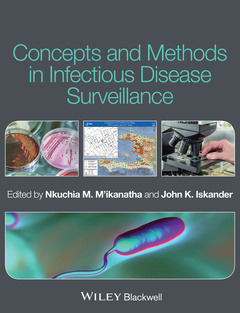Description
Concepts and Methods in Infectious Disease Surveillance
Coordinators: M'ikanatha Nkuchia M., Iskander John
Language: English
Subject for Concepts and Methods in Infectious Disease Surveillance:
296 p. · 19.1x24.8 cm · Paperback
Description
/li>Contents
/li>Biography
/li>
Infectious disease surveillance has evolved at an extraordinary pace during the past several decades, and continues to do so. It is increasingly used to inform public health practice in addition to its use as a tool for early detection of epidemics. It is therefore crucial that students of public health and epidemiology have a sound understanding of the concepts and principles that underpin modern surveillance of infectious disease.
Written by leaders in the field, who have vast hands-on experience in conducting surveillance and teaching applied public health, Concepts and Methods in Infectious Disease Surveillance is comprised of four sections. The first section provides an overview, a description of systems used by public health jurisdictions in the United States and legal considerations for surveillance. The second section presents chapters on major program-area or disease-specific surveillance systems, including those that monitor bacterial infections, foodborne diseases, healthcare-associated infections, and HIV/AIDS. The following section is devoted to methods for conducting surveillance and also approaches for data analysis. A concluding section summarizes communication of surveillance findings, including the use of traditional and social media, in addition to showcasing lessons learned from the New York City Department of Health?s experience in surveillance and epidemiology training.
This comprehensive new book covers major topics at an introductory to intermediate level, and will be an excellent resource for instructors. Suitable for use in graduate level courses in public health, human and veterinary medicine, and in undergraduate programs in public-health-oriented disciplines, Concepts and Methods in Infectious Disease Surveillance is also a useful primer for frontline public health practitioners, hospital epidemiologists, infection control practitioners, laboratorians in public health settings, infectious disease researchers, and medical and public health informaticians interested in a concise overview of infectious disease surveillance.
Section A: Introduction
1. Surveillance as a Foundation for Infectious Disease Prevention and Control
Nkuchia M. M'ikanatha and John K. Iskander
2. The Legal Basis for Public Health Surveillance
Gail Horlick and Jean O'Connor
3. National, State, and Local Public Health Surveillance Systems
Ruth Jajosky and Jennifer Ward
4. Quarantine and the Role of Surveillance in Nineteenth-Century Public Health
David S. Barnes
Section B: Specific Surveillance Systems
5. Surveillance for Vaccine-preventable Diseases and Immunization
Daniel Payne
6. Surveillance for Seasonal and Novel Influenza Viruses
Bruno Ciancio and Piotr Kramarz
7. Surveillance for Bacterial Infections of Public Health Importance
Lee H. Harrison and Gayle Fischer Langley
8. Surveillance for Foodborne Diseases
Elaine Scallan and Casey Barton Behravesh
9. Surveillance of Healthcare-associated Infections
Lennox K. Archibald and Theresa J. McCann
10. Surveillance for Zoonotic Diseases
Linda Capewell Pimentel and Ethel V.Taylor
11. Surveillance of Viral Hepatitis Infections
Daniel R. Church, Gillian A. Haney, Monina Klevens, Alfred DeMaria Jr
12. Surveillance for Sexually Transmitted Diseases
Elizabeth Torrone and Kyle Bernstein
13. Surveillance for HIV/AIDS
Eve D. Mokotoff and James J. Gibson
14. Public Health Surveillance for Tuberculosis
Lori R. Armstrong and Roque Miramontes
Section C: Methods Used in Surveillance and Data Analysis
15. Analysis and Interpretation of Surveillance Data
Louisa E. Chapman and James N. Tyson
16. Global Surveillance for Emerging Infectious Diseases
Jennifer Nuzzo
17. Infectious Diseases Surveillance and Global Security
David L. Blazes and Sheri Lewis
18. Electronic information systems in surveillance: Implementation of the National Electronic Disease Surveillance System in South Carolina
Eric Brenner
19. Electronic Information Systems in Surveillance: Electronic Laboratory Reporting
Richard S. Hopkins and Nkuchia M. M'ikanatha
20. Use of Geographic Information Systems in Infectious Disease Surveillance
Rebecca J. Eisen and Lars Eisen
Section D: Cross-cutting Issues in Infectious Disease Surveillance
21. Communication of Surveillance Findings
Brian G. Southwell and Bridget J. Kelly
22. Lessons Learned in Epidemiology and Surveillance Training in New York City
Elizabeth Chuang and Carolyn Greene
Nkuchia M. M'ikanatha, Division of Infectious Disease Epidemiology, Pennsylvania Department of Health, Harrisburg, Pennsylvania, USA.
John K. Iskander, Medical Epidemiologist, Division of Infectious Disase Epidemiology, Pennsylvania Department of Health, Harrisburg, Pennsylvania and Acting Director, CDC Immunization Safety Office, Atlanta, USA.
These books may interest you

Infectious Disease Surveillance 143.22 €



